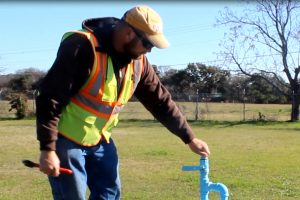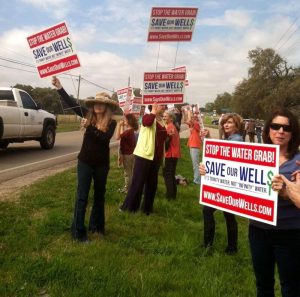By ANDY SEVILLA
About 800 Hays County residents packed the Wimberley Community Center last week and pummeled elected officials and private businessmen over a water supply plan that could pump more than five million gallons per day from the Trinity Aquifer in the county’s western stretches.
“Can you take the rule of capture and bring it up to current-day standards that it applies to personal owners, not a corporation, and it will take care of that whole thing,” one commenter asked State Rep. Jason Isaac of the Houston-based Electro Purification’s (EP) plan to supply water to Buda, Goforth Water SUD and a private development outside of Mountain City.
“They’re (EP) basically taking an old law — from what 1900s — no equipment existed to be able to pump five million gallons a day. And they’re using that law, and abusing it for their own personal gain,” the commenter continued.
Isaac hosted a town hall meeting in Wimberley Feb. 10 to facilitate a discussion between elected officials, groundwater management districts, EP representatives and its customers, to discuss the effects the supply plan could have on domestic wells hooked to the Trinity.
Barton Springs Edwards Aquifer Conservation District (BSEACD) officials said truly assessing the impacts of EP’s water pumping plan on domestic wells in western Hays County would take at least a year.
But the clock is ticking. EPs agreement with Buda allows them nine months to prove the commercial water supplier can produce the 5.3 million gallons of water per day it promised its three customers.
“For the last 5 years, we have met with multiple City, County and Water District representatives in Hays County to … come up with viable water solutions for the area,” an EP manager, Tim Throckmorton, said in a statement.
“We are working with the City of Buda, Goforth Water Supply Company and Anthem Builders (Clark Wilson homes) to provide water to their citizens and customers — water they have been unable to get elsewhere,” Throckmorton continued.
But Buda has found the water supply it would need as soon as 2017 in the Hays Caldwell Public Utility Agency (HCPUA). The regional water group has committed to building a pipeline from Kyle to Buda, and have excess water shared among its partners.
Assistant Kyle City Manager James Earp said at HCPUA’s most recent meeting that Kyle has excess water it could sell to Buda. But, Buda officials wanted to secure a Plan B.
Through EP, Buda could have one million gallons of water per day from the Trinity Aquifer.
Hundreds of residents, however, fear that EP’s massive water drilling proposal would leave them out to dry.
EP has its well field in an unregulated area of Hays County where only the state’s 1904 “Rule of Capture” reigns. Under that Texas Supreme Court decision, groundwater could be pumped without limit or consideration of effects to neighbors’ wells.
That rule can only be changed by legislative action.
Throckmorton said EP’s customers sought water from other governmental entities in Hays County, but were told “no” time and time again due to lacking jurisdiction or enough water. He said when viable alternatives were presented, the governmental agencies rejected those ideas, too.
“What government agencies couldn’t accomplish, EP delivered,” Throckmorton said. “We are happy to be providing a solution of keeping Hays County water going to Hays County communities.”
But questions still remain on whether EP can deliver on its promise. Bart Fletcher, an EP manager told the Hays Free Press last month he wasn’t sure that the company could pump the contracted water and testing was still being done.
Seven test wells have been drilled, and only one has proven ineffective, EP’s hydrologist, Kaveh Khorzad, told the packed Wimberley Community Center.
Throckmorton told the Hays Free Press that residents’ concerns of domestic wells running dry were exaggerated. He said EP’s well field would not affect homeowners in the area, as the company will pump from the Cow Creek Formation of the Trinity Aquifer.
He said once residents understand the science behind EP’s water supply plan, their concerns will be calmed. But, according to BSEACD, that science will take time to deliberate.
Isaac is working in the legislature to “protect” groundwater in Hays County, a move Hays Commissioners unanimously supported through a resolution.
Isaac has bills in the works that would extend the boundaries of the BSEACD and the Hays Trinity Groundwater Conservation District (HTGCD). Isaac introduce a bill in the legislature that would create “five-mile buffer zones” from the furthest stretches of groundwater management districts where groundwater drilling would be regulated by the Texas Water Development Board.
Those measures, however, may not work retroactively and EP may still be allowed to continue their plan if Isaac’s bills get approved.








